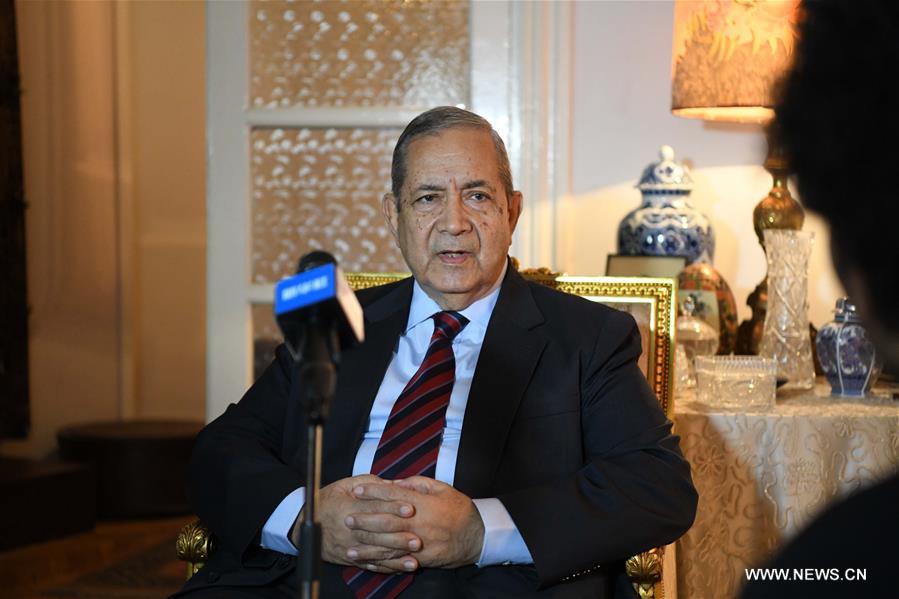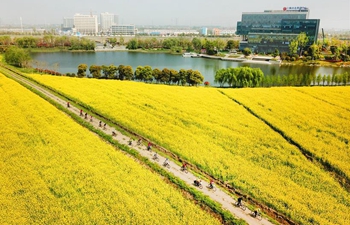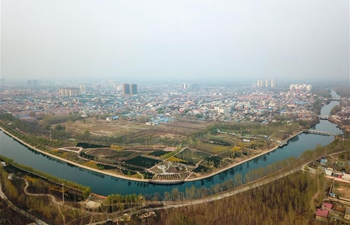
Gamal Bayoumi, head of the Cairo-based Arab Investors Union, receives an interview with Xinhua in Cairo, Egypt, on April 3, 2018. The ongoing trade dispute between the United States and China should be settled through negotiation and dialogue rather than escalation, Gamal Bayoumi told Xinhua in an interview on Wednesday. (Xinhua/Wu Huiwo)
by Mahmoud Fouly
CAIRO, April 4 (Xinhua) -- The ongoing trade dispute between the U.S. and China should be settled through negotiation and dialogue rather than escalation, Gamal Bayoumi, head of the Cairo-based Arab Investors Union, told Xinhua in an interview on Wednesday.
"Escalation of countermeasures between China and the U.S. is not advised, as they are the two largest trade partners in the world," the Egyptian expert said.
On Tuesday, the U.S. government announced a proposed list of imported Chinese products, worth 50 billion U.S. dollars, that it plans to impose 25-percent additional tariffs, under the excuses of punishing China for alleged violation of U.S. intellectual property.
In response, China on Wednesday unveiled a list of imported U.S. products worth 50 billion dollars that will be subject to higher tariffs, including soybeans, automobiles, aircraft and chemical products.
"The escalation worries many states across the globe because it is between the world's two largest trade powers," noted Bayoumi, a former assistant foreign minister.
But he added that the two sides could reach some kinds of settlement within the framework of the multilateral trade negotiations at the World Trade Organization (WTO), which has a dispute-settlement body that can play a positive role in this regard.
China has been calling for resolving its trade dispute with the U.S. through negotiations, while denouncing the U.S. measures as unilateralism, protectionism and conservatism that are harmful to the global economy in general and to the China-U.S. economic relations, in particular.
China's Ministry of Commerce said in a recent statement that the U.S. move has severely severely infringed on the legitimate rights and interests that China enjoys in accordance with the WTO rules, and threatened China's economic interests and security.
"The United States itself is against free trade," Bayoumi said, adding that China has repeatedly said it would respect its commitments in the WTO and the World Intellectual Property Organization.
The United Nations Conference on Trade and Development often accuses the U.S. and Europe of raising exaggerated trade complaints to protect their own products, such as dumping and intellectual property violations, and in the end these complaints turn out to be false claims, Bayoumi said.
The U.S. Congress always goes against free trade by imposing protectionism and non-tariff barriers to free trade, Bayoumi pointed out.
"We as developing states encourage dialogue and reject the use of world trade rules as means of protectionism and ban on free trade," he noted.
China has set up partnerships with many developing states through economic blocs, summits and forums, including the BRICS summit comprising Brazil, Russia, India, China and South Africa, the Forum on China-Africa Cooperation, and the Belt and Road Initiative, to promote multinational economic and trade cooperation.
On April 8-11, China will hold the annual Boao Forum for Asia in the small coastal town of Boao in southern China's island province of Hainan, under the theme of "An Open and Innovative Asia for a World of Greater Prosperity."
"With regard to the 2018 Boao forum, it is good that China becomes a destination for trade relations and exchange of views on global trade, just like the World Economic Forum at Davos, because it mobilizes developing states to work to achieve common interests," Bayoumi said.
He also hailed China as a significant stabilizer in the global trade, especially for developing states.
"We encourage this role and we hope that China's economic growth rate remains high because it benefits the economies of many developing states," Bayoumi said.















